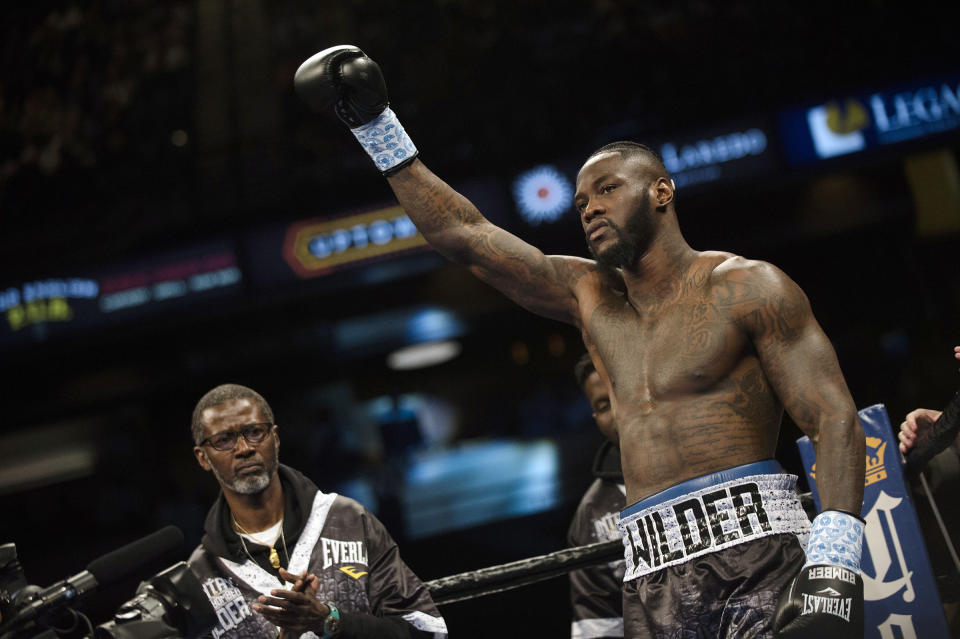Deontay Wilder about to make his case for showdown with Anthony Joshua

It’s hard to know whether to feel sorry for or be angry at Deontay Wilder.
The WBC heavyweight champion, who defends his belt on Nov. 4 against Bermane Stiverne, the man he took it from, has faced a frighteningly low level of opposition for most of his career.
He’s been brutally criticized for it, and he’s well aware of the chatter, particularly among the American boxing fans he’s most looking to please.
It’s easy to criticize, but right now, sympathy seems most in order for the charismatic Alabaman.
When Luis Ortiz failed a drug test recently and was pulled from the fight, he was the third consecutive Wilder opponent – maybe potential opponent is a better way to put it – to fail a test. In addition, Wilder required surgery after his 2016 win over Chris Arreola.
Most notable of those drug test failures came from Alexander Povetkin, the 2004 Olympic super heavyweight gold medalist. Wilder agreed to fight the Russian in Moscow but the fight was called off when Povetkin tested positive for meldonium.
A win over Povetkin, who was 30-1 with 22 KOs at the time he was supposed to face Wilder, would have gone a long way toward establishing Wilder’s legitimacy in the minds of those who had questioned his opposition.
Povetkin was no Mike Tyson, but he was a professional, skilled heavyweight whose only loss was to Wladimir Klitschko.
A fight with Andrzej Wawrzyk in his return from surgery was scuttled when Wawrzyk failed a drug test.
And with no conceivable way to fight Anthony Joshua, the IBF-WBA heavyweight champion, Wilder sought out the hard-hitting Ortiz. Ortiz, who had tested positive for the anabolic steroid nandrolone in 2014 after a win over Lateef Kayode, made for a great potential match for Wilder.
Combined, they are 65-0 with 60 knockouts and the fight figured to be bombs away. When Ortiz failed a drug test again, it was a massive letdown.
Stiverne performed poorly in losing his title to Wilder in 2015 and had done zero to earn a rematch. So the reconstituted bout has lost plenty of luster and disappointed fans who were looking at Wilder-Ortiz as a potential poor man’s version of the 1976 classic between George Foreman and Ron Lyle.
Wilder, though, is not among those. He gets to dispense with his mandatory challenger on Nov. 4 and then can look to make a mega-fight with Joshua, who defends his belts on Oct. 28 against Kubrat Pulev.
“People make so many excuses for my career,” Wilder said. “The one who is actually trying to make a legacy out of their career, he’s the only one who’s not complaining. The people who don’t have to get in the ring and endure this suffering are the ones that are complaining.”
The reason for the excuses is because the potential in Wilder is obvious. He’s got the perfect body for a heavyweight. He’s 6-foot-7 with an 83-inch reach. He’s muscular without being muscle-bound and he has the kind of movement and athletic ability of a man 40 pounds lighter and seven inches shorter.
But because the level of opposition has repeatedly failed to excite, the critics have had a field day.
The dream bout for 2018 would be a Joshua-Wilder match. Joshua is 6-6 with an 82-inch reach, is the 2012 Olympic super heavyweight gold medalist and after his Fight of the Year candidate win over Klitschko in April, he’s 19-0 with 19 knockouts.
A Joshua-Wilder rivalry would be one for the ages. Both are charismatic, with entertaining personalities and they’d be able to sell very well what on paper looks to be a fantastic fight.
There hasn’t been any momentum yet toward making that fight, which irritates Wilder as much as it does the fans and the media.
“I’m the most frustrated guy around,” he said. “I don’t understand. The best are supposed to fight the best, right? I’ve always done that. I called Klitschko out years ago.”
The onus is on Wilder to look good against Stiverne to start things. He was 32-0 with 32 knockouts when he won a decision over Stiverne on Jan. 17, 2015, in Las Vegas. Wilder didn’t look like the spectacular, dominant athlete he’d looked like in his first 32 fights, and the win seemed even more dubious when news broke after the fight that Stiverne was suffering from rhabdomyolysis, which is caused by overtraining and involves kidney failure, shortness of breath and severe muscular aches and weakness.
If he can knock out Stiverne impressively enough that the public demands a unification bout with Joshua, then 2018 will be able to continue the momentum that 2017 has built for the sport.
When there are potential mega-fights in the heavyweight division, it creates wider interest in the sport as a whole and can have a trickle-down effect on fighters in lower weight classes.
So hopefully, Stiverne makes it to the post, with no injuries, no illnesses and no drug test failures.
Then, maybe, we’ll be able to determine just how great Deontay Wilder can become.

 Yahoo Sports
Yahoo Sports 
